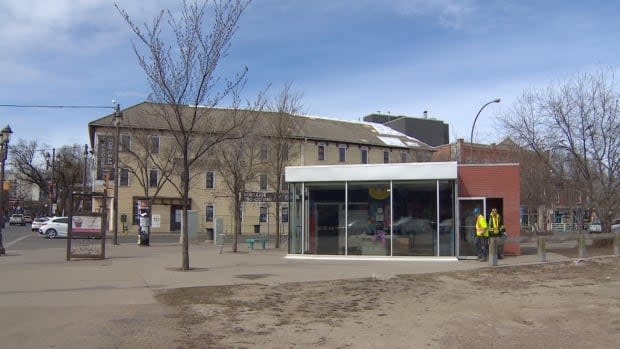Need for clean public washrooms key lesson from COVID-19, Edmonton businesses say

Cleaner public washrooms are high on the wish list of Edmonton's business groups as the city recovers from the COVID-19 pandemic.
Puneeta McBryan, executive director of the Downtown Business Association, said the fallout was apparent last March when Edmonton public libraries and city facilities shut down, and in turn, cut off the bathroom facilities.
"It was very clear that a lack of washrooms was one of the most immediately harmful impacts of the pandemic on downtown," McBryan said during a council executive committee meeting Monday.
In response, the city placed porta-potties last year in the Alberta Avenue neighbourhood and at the Expo Centre.
This year, the city has added portable washrooms at four more locations until the end of October — Village Foods at 85th Street and 118th Avenue; 97th Street and 105th Avenue; the parking lot at the Westin Hotel; and Michael Phair Park on 104th Street.
Porta-potties for the six locations cost $475,000, which includes attendants monitoring and cleaning the washrooms.
McBryan is urging the city to focus on more permanent washrooms when facilities are open again.
"It's a huge need," McBryan said in an interview with CBC Monday afternoon.
"There are the LRT washrooms — there's a few but they're, just to be totally blunt about it, they're kind of gross and scary."
In late 2019, the city paid for attendants to monitor, clean and stock the public washrooms on Whyte Avenue and Churchill Square.
"These washrooms need to be staffed," McBryan said. "It's something that simply needs to be funded and much more widely available across our BIAs."
Besides the Whyte Avenue and Churchill Square locations, two other public washrooms are staffed between 9 a.m. and 9 p.m. at Louise McKinney Riverfront Park and Borden Park Pavilion.
The city is working on a strategy to establish locations and criteria for permanent temporary washrooms.
The Downtown Business Association is one of 13 business improvement areas at the meeting to discuss annual reports and future priorities.
Jay Ball, executive director of the Alberta Avenue Business Association, said they also appreciate the public washroom facilities.
"There is need for more," Ball said. "They are very well used."
Post COVID-19
Cherie Klassen, chair of the business improvement area council and executive director of the Old Strathcona Business Association, told councillors that clean vibrant streets will attract people back in a post-COVID-19 environment.
"Our public realm isn't as welcoming as we need it to be," Klassen said. "Some of these maintenance issues need to be addressed now."
Paving stones on sidewalks, benches and light poles need repairs, she noted, and the business improvement areas are asking for a standard of maintenance across the board.
They are also working on more walkable, pedestrian-friendly zones.
The Old Strathcona Business Association expanded the sidewalks along both sides of Whyte Avenue this season, between 103rd and 105th streets, after piloting them on the north side of the avenue last year to allow for more physical distancing during COVID-19.
At the end of the pilot last year, the business association in Old Strathcona surveyed businesses and patrons on what they thought of the expanded sidewalks and heard "pretty overwhelming support," Klassen said.
The business improvement areas are working on a collective strategic proposal for the city, to outline where they think the city could help them recover from the COVID-19 pandemic.

 Yahoo Movies
Yahoo Movies 